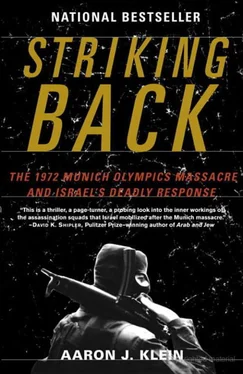Caesarea’s grand pretensions were unveiled during the investigation of the shaky Dan Art/Arbel, a claustrophobic, and Marianne Gladnikoff, the junior agent. Blindly determined, the Mossad had arrived in drowsy Lillehammer and assassinated a man whom they mistakenly took for a Palestinian terrorist. The police investigation and the detainees’ testimonies revealed the incompetent, unprofessional behavior of many team members. Caesarea’s senior officers had a raging desire to complete the mission at any cost, which caused them to act without even a minimal amount of caution. They were arrogant, reckless, overconfident, and stubborn. Their fundamental mind-set flaws were the main reason the wrong man died and the mission was exposed. Mike Harari and the two assassins managed to escape by the skin of their teeth. Only by chance did they avoid being caught.
The Israeli government was unsure how to handle the arrest of the six Mossad operatives in Norway. One of Golda Meir’s worst nightmares had come true. There were long conversations about the right way to respond. The basic question: should Israel take responsibility for the assassination or try to distance itself? As in the past (in several incidents in Arab countries), the government in Jerusalem chose to take the middle path. Without publicly acknowledging their role in sending the team, the government sent Foreign Ministry legal advisor Meir Rosenne to Norway, and shortly thereafter, Eleazar Palmor, a Foreign Ministry official who was appointed special advisor to the embassy. The government ordered Palmor to follow the trial closely, establish connections with local legal bodies, and tend to the needs of the detainees.
In Golda Meir’s office in Jerusalem, Zvi Zamir and Mike Harari turned in their resignations in the presence of her military aide, Yisrael Lior. She refused to accept them. “There are people in jail,” she said. “You can’t get up and leave; there is work to be done.”
On Friday, four days after the episode was exposed, Meir sent Lior to Mossad headquarters in Tel Aviv, to check on Harari’s emotional and mental state. Harari did not blame himself for the mistake or the detention of six agents under his command. When asked about the embarrassing affair, he said, with an almost Clintonian eloquence, “I take responsibility upon myself, but not the guilt.” At other times, he said, “When the sharpest combatants succeeded, it was my success; when they failed, it was my failure.”
The six sat for a public trial, the focus of intense media coverage in Norway, Israel, and the rest of the world. Sylvia Rafael impressed reporters with her calm appearance and witty demeanor. When Avraham Gemer was called to the witness stand, he sat there a short while, stubborn and distracted. Only Dan Art/Arbel appeared shocked and afraid. He wrung his hands nervously as he explained his reasons for joining the “Scandinavian mission.” He said that the operation appealed to him because his expenses were paid and he had just purchased a new house in Israel, which he wanted to furnish. Asked the prosecutor: “Did you really believe that Israel would step in to assist an illegal group working in Norway?” Answered Art/Arbel: “To tell you the truth, because of the good relations between Norway and Israel, I thought that the issue would be solved in private between the two nations. It was my innocence that made me think like that.” Arbel said on the stand that he had given the Oslo police investigators a number in the Hadar Dafna Building in Tel Aviv—256-230—so that they could confirm his story.
Avraham Gemer was incensed. Sensitive intelligence was being bandied about in public. He requested, by way of his representative, that the trial resume behind closed doors. The court agreed. Meanwhile, the reporters dashed out of the courtroom and ordered the operator to connect them to 256-230 in Tel Aviv. A recording with a message in English said, “This number is no longer connected.”
On February 1, 1974, the six were sentenced. Michael Dorf, a communications and codes agent, was the only one found not guilty and released. The five other Israelis were found guilty and sentenced as follows: Zvi Steinberg, logistical agent for the operation, was sentenced to one year in prison for gathering information for a foreign country; Marianne Gladnikoff was sentenced to two and half years for her involvement in the murder. Dan Art/Arbel was sentenced to five years for having secondhand knowledge of a premeditated murder. Avraham Gemer and Sylvia Rafael were sentenced to five and a half years for their involvement in the murder. The court found that all six played minor roles in the shooting of Bouchiki, when compared to the assassins and the operational planners who had managed to escape.
The bitter mistake that cost the waiter, Achmed Bouchiki, his life, weighed like a millstone on the shoulders of the state of Israel. It had long-lasting effects on Israel—in its relations with Norway and with other nations, as it was suddenly seen as a state carrying out its own brand of international terror.
For years, Israel denied responsibility for the incident. Only in January 1996 did Prime Minister Shimon Peres veer away from years of Israeli government policy. He sent a leading Israeli lawyer to Oslo to conduct compensation negotiations with the family of the murdered victim. Israel agreed to pay for the shooting of the father of the family without taking official responsibility for the act. The negotiations continued for but a few hours. An agreement was quickly reached, in which Israel expressed regret over the actions in Lillehammer and offered compensation to the family totaling almost $400,000.
Thirty-one years after the court’s verdict, on a warm, clear winter day, veteran Caesarea combatants and staff officers attended the funeral of their friend, combatant Sylvia Rafael, who had lived for the past twenty years in South Africa with her partner, Norwegian lawyer Anneus Schodt, her defense attorney during the Oslo trial. During the long legal ordeal, they had fallen in love. He had left his family following her release from prison. On the afternoon of February 15, 2005, she was buried in the small cemetery at Kibbutz Ramat Ha’Kovesh, which had adopted her during her incarceration. She was buried at age sixty-seven, in the heart of the fields and in the shade of cypress trees.
Dozens of friends, many of them with salt-and-pepper hair and walking sticks, stood around her grave. Three former heads of the Mossad came to pay their final respects. They stood around the grave. Mike Harari, Caesarea commander, the man responsible for the Lillehammer mission that landed her in jail, offered a eulogy: “Sylvia was a Caesarean of noble stock, who volunteered to be a combatant for the nation of Israel…. They say that those who don’t act, don’t make mistakes, and never have problems. We acted! We did so much and we succeeded. When we succeeded, they called us ‘professionals,’ ‘the hand of God,’ and more. And when we failed, they called us ‘ shlomeil s.’ The truth is we weren’t shlomeil s, and we weren’t professionals. We simply fulfilled our mission to defend the nation of Israel.”
30
CLOUDY SKIES SAVE ARAFAT
TEL AVIV, AIR FORCE OPERATIONS ROOM
SPRING 1974
Lieutenant Colonel Jonathan Mor picked up the scrambled phone. “Mor,” he said, tight for time, preoccupied by the dozens of raw intelligence reports that had landed on his desk since early morning. The person on the other end of the line was equally direct. “Initial, unchecked reports show that Arafat is at Fatah headquarters in Nabatiya, for a meeting with local commanders. We’ll be back in touch as necessary.”
Mor swallowed, no longer distracted by paperwork. “You sure it’s him?”
Читать дальше












